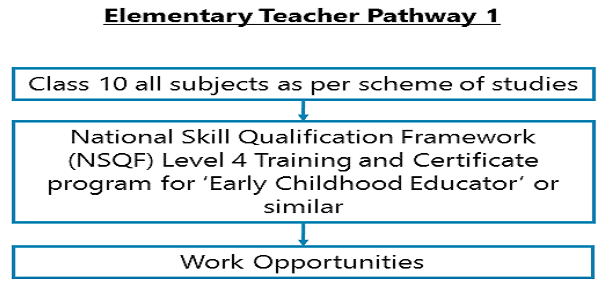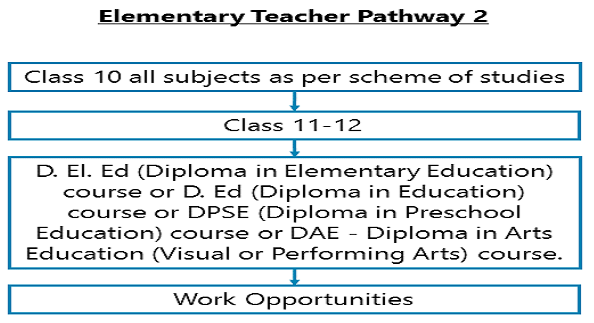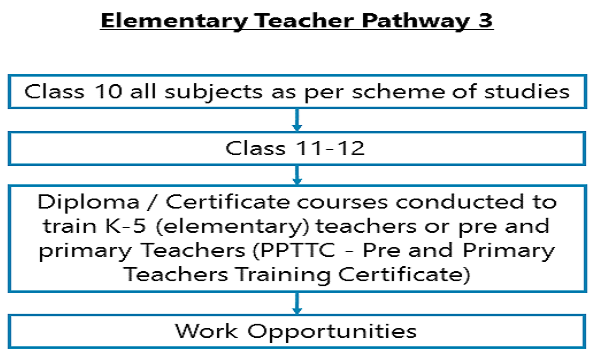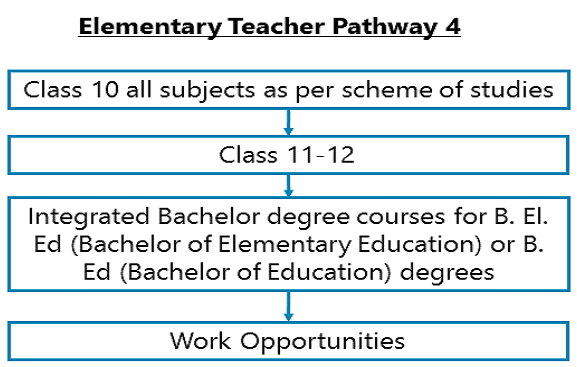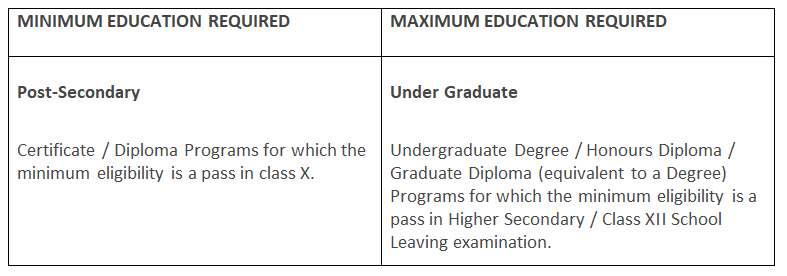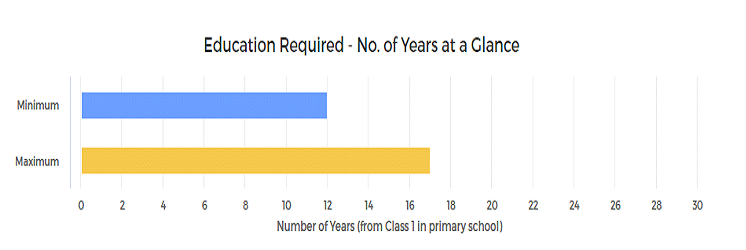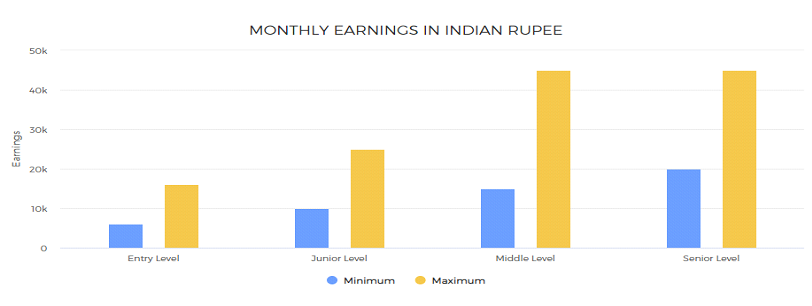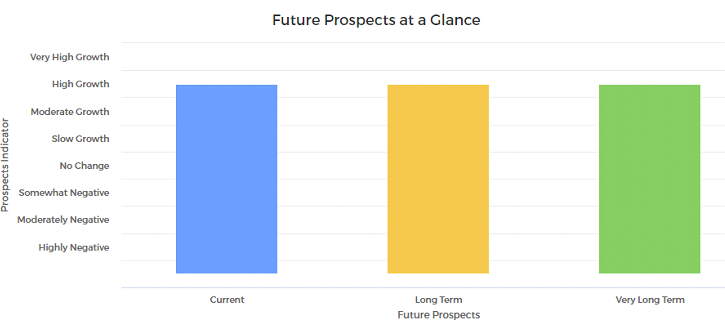Elementary Teacher
Entry Level Qualification
10
Career Fields
Education & Teaching
For Specially Abled







Career Entrance Exam
About Career
PARTICULARS | DESCRIPTION |
Name | Elementary Teacher |
Purpose | Teaching |
Career Field | Education & Teaching |
Required Entrance Exam | UPJEE BED |
Average Salary | 80000 - 200000 Rs. Per Year |
Companies For You | Central Government funded institutions, State Government funded institutions & Many More |
Who is Eligible | Class 10th Pass |
As an Elementary Teacher, you will be working in public or private elementary schools (K-5: schools for children between 5-11 years old; usually from nursery to class 5). You will be teaching students in one or more subjects and instruct in English and / or other vernacular languages. Your assigned subject(s) may depend on your levels of educational qualifications.
You will have to adopt various instructional and teaching methods so that the needs of every child are met. You may have to prepare materials, before you teach, according to your teaching schedules and school syllabi. You may have to organize play activities or extra-curricular activities for your students and ensure that every child is equally involved.
You will be involved in assigning tasks to your students which are to be completed while at home, checking whether every child submits home tasks regularly and grading the tasks as well. You may also be responsible for updating attendance registers and maintaining accurate class records as per administrative guidelines. You will also have to ensure that every child in your class is prepared for the next higher grade.
You will be observing and evaluating every child in your class for preparing their performance reports. You will have to interact with the guardians of your students to keep them informed about their ward’s progress and conduct in school. You will have to coordinate with your colleagues (other teachers and staff members) and participate in discussions and meetings regarding school development, curriculum planning, training workshops, classroom equipment, teacher recruitment, annual functions etc.
Key Roles and Responsibilities:
As an Elementary Teacher, you will be engaged with one or more of the following roles and responsibilities: -
1. You will be teaching in one or more subjects and instruct in English and / or other vernacular languages.
2. You will be communicating with your students through lectures, demonstrations, audio-visual aids, e-learning programs or discussions.
3. You will have to adopt various instructional and teaching methods so that the needs of every child are met.
4. You may have to prepare materials, before you teach, according to your teaching schedules and school syllabi.
5. You will be assigning home-tasks to your students, checking whether every child submits home tasks regularly and grading them as well.
6. You will be conducting regular class tests or also be involved in invigilation during school examinations.
7. You will be observing and evaluating every child in your class in order to prepare their conduct and performance reports.
8. You will be organizing play activities or extra-curricular activities for your students and ensure every child is equally involved.
9. You will be interacting with the guardians of your students to keep them informed about their ward’s progress and conduct in school.
10. You will be ensuring that every child in your class is prepared for the next higher grade.
11. You will be coordinating with your colleagues (other teachers and staff members) and participate in discussions and meetings regarding school development, curriculum planning, training workshops, classroom equipment, teacher recruitment, annual functions etc.
Career Entry Pathway
Class 10 all subjects as per scheme of studies - NSQF Level 4 Certificate for ‘Early Childhood Educator’
After Class 10, you can go for National Skill Qualification Framework (NSQF) Level 4 Training and Certificate program for ‘Early Childhood Educator’ or similar courses. The total number of training hours is 2080.
Class 10 all subjects as per scheme of studies – Class 11-12 with any subject combination as per scheme of studies – D. El. Ed or D. Ed or DPSE or DAE or Integrated B. El. Ed or Integrated B. Ed
After Class 12, you can go for any of the following - D. El. Ed (Diploma in Elementary Education) course, D. Ed (Diploma in Education) course, DPSE (Diploma in Preschool Education) course, DAE - Diploma in Arts Education (Visual or Performing Arts) course.
Class 10 all subjects as per scheme of studies – Class 11-12 with any subject combination as per scheme of studies – Diploma / Certificate courses for Pre and Primary Teachers Training
After Class 12, you can go for any Diploma / Certificate courses conducted to train K-5 (elementary) teachers or pre and primary Teachers (PPTTC - Pre and Primary Teachers Training Certificate). These courses may be in regular or correspondence formats (both classroom and online). There are various private and public institutes across the country providing such courses.
Class 10 all subjects as per scheme of studies – Class 11-12 with any subject combination as per scheme of studies – Integrated B. El. Ed or Integrated B. Ed
After Class 12, you can go for any Integrated Bachelor degree courses for B. El. Ed (Bachelor of Elementary Education) or B. Ed (Bachelor of Education) degrees. Integrated courses are usually 4 year programs.
Required Qualification & Competencies
After Class 10, you can go for NSQF courses as described.
After Class 11-12, you can go for:
1. D. El. Ed. courses.
2. D. Ed. courses.
3. DPSE courses.
4. DAE (Visual or Performing Arts) courses.
5. Integrated B. El. Ed courses.
6. Integrated B. Ed courses.
COMPETENCIES REQUIRED
1. You should have interests for Social Occupations. Social occupations involve helping or assisting others; these involve working with and communicating with people to provide various services; these may involve educating and advising others.
2. You should have interests for Artistic Occupations. Artistic occupations mostly involve working with creative ideas, art, and designs. These occupations involve abstract or conceptual thinking, creative self-expression and often do not follow any set processes or rules for getting things done.
3. You should have knowledge of Education and Training - various principles and methods of developing training or teaching curriculum, design of instructional methods, developing course materials, teaching and giving instruction individuals and groups.
4. You should have Instruction Skills - training others how to do something.
5. You should have Teaching Skills - teaching and educating others about various academic and applied subjects across different academic fields.
6. You should have Active Listening Skills - Giving full attention to what other people are saying, understanding the points being made by others, asking questions, etc.
7. You should have Reading Comprehension Skills - Skills in understanding written sentences and paragraphs in work related documents.
8. You should have Critical Thinking skills- Skills in the analysis of complex situations, using logic and reasoning to understand the situations and take appropriate actions or make interpretations and inferences.
9. You should have Oral Comprehension Ability - listen to and understand information and ideas presented through spoken words and sentences.
10. You should have Oral Expression Ability - communicate information and ideas in speaking so others will understand.
11. You should have Deductive Reasoning Ability - apply general rules and common logic to specific problems to produce answers that are logical and make sense. For example, understanding the reasons behind an event or a situation using general rules and common logic.
12. You should have Speech and Language Recognition Ability - identify and understand the speech and language of another person.
13. You should have originality - The ability to come up with unusual or innovative ideas about a given topic or situation, or to develop creative ways to solve a problem.
14. You should have Fluency of Ideas - The ability to come up with a number of ideas about a topic (the number of ideas is important, not their quality, correctness, or creativity).
15. You are mostly impulsive.in your action and behaviour.
16. You are always imaginative or in most situations.
17. You act independently sometimes but do not do so in some other times.
Career - Job Opportunities & Profiles
You will find work roles as:
1. Elementary Teacher
2. Pre-school Teacher
3. Pre-school Demonstrator /counselor
4. Day-care & Care teacher
5. Assistant Teacher
6. Teacher Pre-Primary
You will get numerous job opportunities as a Teacher in various public or private elementary schools (schools for children between 5-11 years old; usually from nursery to class 5), Central Government funded institutions, State Government funded institutions, K-5 education institutions privately funded or under PPP (Public Private Partnership), private coaching institutions apart from schools, vocational training centers, e-learning companies, or as subject matter experts hired to solve queries through Web portals for students who are residing internationally. You may also find work as a trainer involved in conducting corporate training workshops after some years of teaching experience.
CAREER GROWTH
An Elementary Teacher remains so for most of their career. There is hardly any change in designation although you may earn more and change schools. If you can earn higher educational qualifications you may transition into a Senior Secondary School Teacher or later the Headmistress or Dean of a school or any educational institution.
However, as you grow in experience and years you may also set up your own educational institution whereby you can establish yourself as an Entrepreneur as well educate young minds following your administrative principles.
You may also write books concerning your field of work and to address common frequently asked questions of guardians, students etc.
Salary Offered
1. In the entry-level jobs: You may get about. 6,000.00 – Rs. 16, 000.00 or more a month.
2. After having 1-6 years of experience, you may expect about Rs. 10,000 – Rs. 25, 000 a month or more.
3. After having 6-12 years of experience, you may get about Rs. 15,000.00 – Rs. 45,000 a month or more.
4. In the senior level jobs, with 12-20 years of work experience, you may expect to get about Rs. 20,000 – Rs. 45, 000 a month or more.
MONTHLY EARNINGS IN INDIAN RUPEE
1. Entry level: 0 - 2 years of work experience
2. Junior Level: From 1 to 12 years of work experience
3. Mid Level: From 5 to 20+ years of work experience
4. Senior Level: From 10 to 25+ years of work experience (there could be exceptions in some high-end technical, financial, engineering, creative, management, sports, and other careers; also in the near future, people will reach these levels much faster in many careers and in some careers, these levels will have no meaning as those careers will be completely tech skill driven such as even now, there is almost no level in a Cyber Security Expert’s job)
Work Activities
1. Training and teaching - Understanding educational and training needs of others, developing training programs and educational programs, conducting training prorams, teaching and instructing others.
2. Coaching and developing - Identifying training and professional development needs of others; coaching and training them to develop skills to perform tasks and improve performance.
3. Getting Information and learning - Observing, hearing, reading, using computers, or otherwise obtaining information and learning from it.
4. Translating and interpreting - Translating or interpreting information for other people who are written or spoken in languages that other people do not understand.
5. Creative thinking - Developing new ideas, concepts, innovative solutions to problems, newer ways of getting things done, designing products and services and creating effective, user-friendly and appealing products.
6. Assisting and caring for people - Assisting people in availing of services; taking care of people in different situations; offering help and services to others.
7. Developing and maintaining inter-personal relationships - Developing professional relationships with co-workers and others outside organisations and maintaining good relationships.
8. Organising, planning and prioritising tasks - Planning and organising tasks in order to achieve work goals; prioritising tasks to achieve goals and making the best use of the time available.
9. Communicating with co-workers and others– Communicating with people in writing, verbally or otherwise inside your workplace and various other people who have professional relationships with your place of work.
10. Working in a team
Future Prospects
The road ahead for this pathway looks bright. The numbers are proof! India has nearly 8, 08,802 recognized primary schools spread across the country. Today, nearly 99% of the rural population has access to a primary school within 1 km. Many more elementary and preparatory schools are opening across the country.
The Education Industry in India is predicted to reach 144 billion US Dollars by 2020. 67 lakh out of 1.07 crore people employed in the school education sector are teachers. Number of teachers employed in recognized schools in India is expected to reach 8.90 million by 2022. Students belonging to the age bracket of 6 – 17 years will increase to 346 million by 2022. India is a country with 28% of its population aged between 0 and 14 years and about 500 million aged between 5 and 24 years.
Education sector in India is witnessing tremendous growth and is a strategic priority for the Indian Government. In order to tackle the growing student population and dearth of talented teachers, the Government has established National Council of Teacher Education (NCTE) to equip teachers preparing to enter the school system (pre-service training) and to reskill existing school teachers (in-service training). By 2022, the country requires 700 million skilled workers to meet the needs of a growing economy. The Central Government has assumed a target to skill-train 500 million people during this time. The e-Learning market in India is expected to reach 1.96 billion US Dollars by 2021 and is the 2nd largest after the US. The Indian Government has targeted to reach a Gross Enrolment Ratio (GER) of 30% by 2020 for higher education.
This is also aimed at increasing the share of the Services sector in the country’s GDP. Revitalising Infrastructure and Systems in Education (RISE) was announced in the Union Budget of 2018-19. This is aimed at consummation by 2022. The pre-school market in India is also expected to grow at a rate of 23% compounded annually between 2017 and 2022 hence promising an increase in the volume of students enrolling for subsequent school level education across the country.
FUTURE PROSPECTS AT A GLANCE


